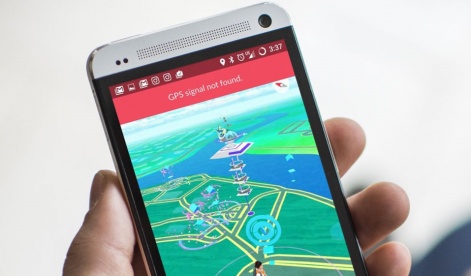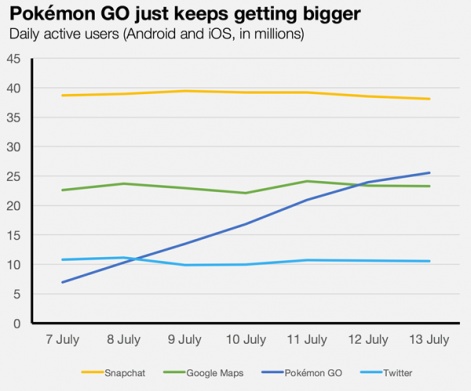In our previous Mobile Mavens discussion, the topic was the enormous success of Pokemon GO.
And soon after, we asked our Indie Mavens whether that success would have any influence over how they make games.
Now, we're turning our focus to the location-based technology upon which Pokemon GO has been built and the impact that it will have on the mobile games industry at large.
We asked our Mobile Mavens:
- Will Pokemon GO inspire a wave of location-based imitators?
- Is the future bright for location-based gaming?

Oscar Clark has been a pioneer in online, mobile, and console social games services since 1998. He is also author of the book, Games As A Service – How Free To Play Design Can Make Better Games.
Well, thanks for that extensive analysis! Sadly, you're probably right.
I looked back at an article I wrote over four years ago, when I was "lost on location."
At that time, my concerns were that we needed location-based games that would empower players to cultivate their most regularly visited spaces, as well as to allow them to benefit from the daily travel that they have to do anyway, rather than forcing them to move around for our games.
Pokemon is a unicorn - or perhaps a Pikachu - they don't appear every day.Oscar Clark
In this, it seems that I was wrong. Pokemon GO shows that we needed a brand which would give us the intrinsic value to get off our butts and go catch them all.
The problem is that Pokemon is a unicorn - or perhaps a Pikachu - they don't appear every day.
This game has the equivalent of $1 billion dollars of emotional engagement already built into its history and one which captivates the imagination.
Location-based gaming happened to be what we wished we could do with the game in its original form. Most gamers have been waiting for this!
The use of geo-marked locations to create Pokestops near to you is brilliant, and the use of cultural buildings for gyms is also brilliantly simple - even if that has led to some notable issues regarding cultural insensitivity or alleged trespassing.
I love the ability to set Lures at Pokestops which benefit everyone. I do worry that there is a significant difference in playing experience for people living/working in more rural or suburban areas.
Unlike London or Brighton, the volume of PokeStops and frequency of appearances of Pokemon in my area is pretty thin on the ground.
This means that unless you are travelling into a larger city its not going to be as compelling longer term - you can't keep up with others.

Any game wanting to be a fast follower off the back of Pokemon explosion has to understand these issues to be successful. I think they will need to consider the following questions:
- Have you a compelling collectable brand?
- Why will players get off their sofa to play - and how far are they willing to go?
- What safety measures do you need to put in to avoid accidents?
- How do you balance rural and city experiences?
- How will you build social experience into the game?
The games that consider these things might - just might - be in with a fighting change

A games programmer before joining Sony’s early PlayStation team in 1994, he then founded developer Pure Entertainment, which IPO’d and launched a free-to-play online gaming service way back in 1999.
He was also a director of pioneering motion gaming startup In2Games, which was sold to a US group in 2008.
Along the way, he’s been a corporate VP, troubleshooter, and non-exec to a variety of companies and investors in and around the games sector.
Harry was European CEO of Marvelous AQL, a Japanese developer and publisher of social, mobile and console games, known for console games like No More Heroes and Harvest Moon, but now highly successful in the free-to-play mobile and web space in Japan and Asia.
Harry is CEO of Magicave.
We'll definitely see a wave of imitators using both the location and AR angles of Pokemon GO.
I'm hopeful that this might open the door to broader adoption of some great location experiences that have been around a while already - treasure hunts, guided tourist walks, and so on.
The idea of location games could become 'a thing we did in summer 2016'.Harry Holmwood
But it's harder to judge if this will become a genre of games with a number of similarly huge franchises - in the western market at least.
I think this game is one of the most fascinating phenomena we've seen in the industry for a long time.
What will be interesting is to see if and how it (or other games that emerge afterwards) retains mainstream players' interest in the long term, or if people tire of it quickly and the idea of location games becomes 'a thing we did in summer 2016'.
Like the Wii console left unplayed by many after the initial thrill of motion gaming wore off, or the rapid slowdown of Draw Something after its astounding peak, for example.
My gut feeling is it will continue to do very well among fans, although will suffer a big decline in 'non-hardcore' use after the first couple of months. That might not matter, as it's the hardcore fans are the ones who will spend biggest.
Whatever happens, this is yet another illustration of Nintendo's 'dare to be different' strategy coming up trumps again, and a great sign that innovative, fun games can always find success in this business.

Founder and CEO of Chorus Worldwide, a publisher for Western mobile developers seeking success in the Asian markets, Shintaro has over 20 years' experience within the gaming industry.
He has worked in various roles from game production, localisation, marketing and business development at companies such as EA, SCEE, Rare and Microsoft.
Hard to add much to what’s already been said, especially Wilhelm’s comments!
The interesting thing for me is that this seems to have introduced Pokemon to a whole new audience. My kids had never played a Pokemon game before, but are now actively collecting them wherever they go.
This may create brand affinity with future Pokemon smartphone games, even if they’re not location-based. That renewed brand awareness will also be exploited for the recently announced live-action movie.
Kimishima-san, Nintendo’s CEO, was involved with The Pokemon Company directly, as well as having been Nintendo Of America’s head.
So it appears that he’s playing to his strengths with both Pokemon GO and the NES Classic, and those choices are working very well.
Add to that the Detective Pikachu movie, NX’s launch this year, and things are looking rosier for Nintendo than they have in years. And as we all know, a strong Nintendo is fantastic for the industry as a whole.
- Absolutely. The industry has always followed the model of small children playing football (European, not American). Wherever the ball goes, all the children will collect there. Pokemon GO is one heck of a ball to chase over.
- The future is bright, but most attempts will surely fail.
It’s not going to be easy. Here’s why:
AR and/or location-based gaming has been around for a long time. Bot Fighters (2000, It’s Alive), Tokyo Fishing (2003?, NTT DoCoMo) etc … but it never took off like this. Pokemon GO may just be the most popular mobile app in the USA.

So why? James Cameron choose a very well worn, familiar story arc for the technically ground-breaking 3D film Avatar - basically Dances with Wolves or Pocahontas in space.
He did this because new tech fares best when people can get their heads around it. Pokemon is a 20+ year-old franchise, familiar to most people, so that eliminated much of the “what is this?” issues.
It’s basically, at this point, single player for the most part, with some non-real-time multi player aspects.
I’m pretty sure we will see realtime PvP and trading soon, but the model they went with allowed for rapid growth without relying on players willing and ready to do real-time play with others.
Replicating the success of Pokemon GO isn’t going to be easy at all, and many companies will try.William D. Volk
Several years ago, we had a project titled “Blowing Stuff Up” which was basically a AR location based tank/artillery/missile game - your physical location was the location you fired from.
Besides coming to the conclusion that we needed a lot of capital to pull this off, we recognised that getting sufficient liquidity of players was going to be a serious issue,
Oh yes, about the small matter of expertise. As Chartboost points out: "Even Ingress, with one million players, took Niantic founder John Hanke nearly two decades of experience in mapping, GPS and game design to create."
"Ingress needed to be re-skinned with Pokemon, one of the world’s most widely recognized brands with the backing of Google and Nintendo, to create a smash hit.”
Even with all of that the game is still easy to crash. I am amazed that it even works as well as it does, given the insane level of growth.
Kudos for the camera functionality as well. This is creating a social sharing situation that surely helps with the success (see my two most popular pics).
So replicating the success of Pokemon GO isn’t going to be easy at all, and many companies will try.























